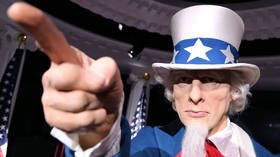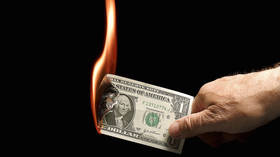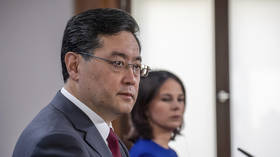The EU wants to move out of Uncle Sam’s basement but is too picky about its economic roommates

EU citizens want more independence from the US, according to a recent survey. Their interest in more neutrality towards China will help achieve it, but their position on Russia certainly won’t.
Just under half of the 16,168 surveyed citizens of 11 EU member states consider the bloc’s security relationship with Washington to be beneficial, and the vast majority see the US as an ally or strategic partner, but a whopping 74% of them (up from 66% in November 2020) said that the European Union can’t rely on the US and needs its own defense capabilities, according to a poll conducted by the European Council on Foreign Relations think tank. So basically, the EU is a college student who realizes that it’s time to grow up and move out of Uncle Sam’s basement, even though it’s comfy and easy living under his roof. And in this case, that roof is an American nuclear umbrella.
Western Europeans like the perks of security, but also want their freedom – just like every teenager in the history of mankind. Eventually though, they realize that, if you want independence, then you need to have some “screw you” money. In other words, enough cash from a wide variety of sources to tell off any single one of them if they infringe on your autonomy. At this point, the EU can’t afford to tell off Uncle Sam. Its dependence on the US has only grown in the wake of cutting off its economic and energy relations with Russia. The EU realized just how little leverage it had with Washington when it had to beg for cheaper prices for American liquefied natural gas on which it has become overdependent as a substitute for its former (and much cheaper) Russian supply. Then, when the Biden administration added insult to injury by shutting out Europe’s green industry from the US market under the protectionist Inflation Reduction Act, Brussels found itself once again at the mercy of Washington’s goodwill. And unfortunately for Europe, Washington is entirely pragmatic when it comes to economics. And it looks like EU citizens want their own leaders to do likewise – starting with refusing to ride shotgun with the US in the regime-change mobile after guzzling some liquid courage and setting the GPS for Beijing.
The poll found that 62% of them want the bloc to stay neutral in any conflict between the US and China. In other words, they’re on the same page as French President Emmanuel Macron. “The question Europeans need to answer … is it in our interest to accelerate on Taiwan? No. The worst thing would be to think that we Europeans must become followers on this topic and take our cue from the US agenda and a Chinese overreaction,” Macron said back in April, to criticism from China hawks both in the US and the EU.
Macron has figured out that you can’t have truly independent military and foreign policy positions of your own if you can’t stand on your own two feet. Macron happened to come to this realization after a visit to China back in April during which he scored some major business deals for France at a time when he desperately needed some darts on the board as the country suffered (and continues to suffer) from high inflation and energy prices. So, Macron suddenly started speaking up about the need for “strategic autonomy” vis-à-vis the US. It’s amazing how some big business deals, including the sale of 160 new commercial jets for French-headquartered Airbus and a doubling of Airbus’ production in China – which represents a huge win over the European company’s American rival, Boeing – seemed to embolden Macron’s push for independence from Washington. It’s really amazing what big money can do. Just like a college kid who gets a job and moves out, starts making his own cash, and now suddenly finds the courage to start telling mom and dad what he really thinks and wants. And what Macron apparently wants is more of the independence that only big money can buy.
Macron’s worldview of a need for independence from the US and more neutrality on China, a position that’s reflected by EU citizens themselves in this new poll, clashes with the positions of other virtue-signaling leaders of the bloc who routinely place ideology over pragmatism. European Commission President Ursula von der Leyen has bought into the notion perpetrated by the US State Department of “de-risking” from China, which seems to be the new buzzword to replace “de-coupling,” which is just not feasible given China’s massively intertwined economic relations with the West. So instead of seizing an opportunity to keep her foot safely out of her mouth, she’s been going around promoting the need to “de-risk.” German Foreign Minister Annalena Baerbock has echoed the sentiment, as has EU chief diplomat Josep Borrell, with both calling China a “partner, competitor, and systemic rival,” and Baerbock adding that the rival aspect was growing. In reality, this means that the EU is either going to publicly promote the notion of “de-risking” but not “de-coupling,” while quietly continuing business as usual with China and just hoping that China isn’t too insulted by the term. Or else it’s really going to put its money where its mouth is and stick spokes in the wheels of its own badly banged-up economic engine that just entered recession territory.
If the EU’s course of action was solely determined by this kind of posturing, then Brussels would just spend all its time lecturing everyone and doing business with no one. It would be like the teenager who never leaves mom and dad’s basement because no job or roommate could ever possibly be good enough for them.
The EU set itself way back economically when it jumped on the anti-Russian bandwagon, following Washington’s lead, but at a much higher cost to itself than to the US (which ended up being the big beneficiary of increased EU economic dependence). A majority (64%) of the surveyed Europeans, who have been bombarded nonstop with the establishment’s anti-Russian narrative amid the Ukraine conflict, now consider Russia to be a rival or adversary to the EU itself, with which Russia is not in direct conflict – up twofold from 2021. Yet it was the EU’s economic cooperation with Russia that helped secure the kind of independence from the US that these same respondents now crave. And while they now claim to be reluctant to travel down the same path of economic dissociation with China, will they change their minds if and when the anti-China propaganda ramps up and frames Beijing as a threat to Europe, as it has with Russia?
Europe has to figure out how to strike a balance between its propensity for lecturing everyone on values that even it violates routinely on the one hand, and diversifying its cooperation to ultimately help lift it to greater independence on the other. Meanwhile, Western Europeans have to pick a lane and decide whether they really want the kind of autonomy that only money can buy, or whether they’re willing to sacrifice their own interests every time their leaders order them to do so for ideological purposes.
The statements, views and opinions expressed in this column are solely those of the author and do not necessarily represent those of RT.















